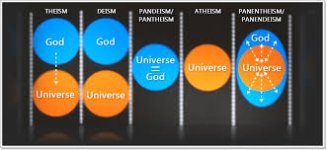For one, we know that the singularity is likely to be wrong because we don't have a quantum gravity theory.
What does gravity operate on? …Matter?
Our best science thus far infers that matter began.
Thus gravity also began. It gets you nowhere.
Too simply stated I’m sure, but the point is still there.
Don't say "cosmologists" when you're quoting only one.
Petty. I quoted one and referenced others. Look again.
However, we cannot know what state the universe was in prior to the putative "t=0" time
Yes……It was not there. There was no space there for the universe to be in. There was no time there for the universe to be in.
Those are unsubstantiated assertions. How can you know there was no space? How can you know there was no time?
Well take a look at those other references I cited and think about it.
Also how is it you can say that I can’t know, but above you said you know the singularity is wrong? Double standards again just like an eternal God needing a cause when an eternal universe wouldn’t. Consistency matters. Quit conflating knowledge with absolute certainty when it suits you.
The direct observation of science ends at t=0.
That doesn't mean there weren't things before t=0 that we simply cannot observe. What if the universe when through some kind of phase change at t=0 and produced the observable universe and there was no "god" behind it?
Note your statement is metaphysical not scientific. So if we can’t observe it directly, then let’s forensically examine the universe now and determine the state of affairs at t<0. The “thing” would have had to be spaceless, timeless and immaterial because at t=0 space, matter and time began to exist. A universe that has no space, no time and no matter is no universe. So….A phase change of what?
So again……If all space, time, matter and energy came into existence at t=0, then the universe was not there at t<0.
Cart before the horse. You are assuming that there was no existence before t=0 and then concluding that there was no existence before t=0. I am challenging your premises, not your argument.
No, that was a common “if-then” statement. The antecedent was not assumed. Simply replace my “if” with “since” to clarify it for yourself.
So again……If all space, time, matter and energy came into existence at t=0, then the universe was not there at t<0.
We don't know that the first part is true. And maybe we can't know what form the universe had before t=0 if it did, but that doesn't imply that there must be a "god". And it certainly doesn't imply any particular characteristics of said "god" even if it did.
Parsed…
We don't know that the first part is true.
There you go again. You don’t know for CERTAIN. But that does not imply one does not know. You don’t know for certain that the sun will rise tomorrow morning but you know that it will. So yes it is most plausible that the antecedent is true. Give me a good reason why I should not expect the sun to rise tomorrow.
And maybe we can't know what form the universe had before t=0 if it did, but that doesn't imply that there must be a "god". And it certainly doesn't imply any particular characteristics of said "god" even if it did.
Now you have your metaphysics the other way around. God does not infer the cause, the cause infers God. The characteristics of the cause come first. The cause would have to be spaceless, timeless, immaterial, nonphysical, eternal and uncaused. And it is that list of characteristics that infers God.
Post 154
Ok.. here's what Arvind Borde, Alan H. Guth, and your buddy Alexander Vilenkin actually said in a scientific context (bold emphasis mine):
https://arxiv.org/abs/gr-qc/0110012
Whatever the possibilities for the boundary, it is clear
that unless the averaged expansion condition can somehow
be avoided for all past-directed geodesics, inflation
alone is not sufficient to provide a complete description of
the Universe, and some new physics is necessary in order
to determine the correct conditions at the boundary.
This is the chief result of our paper.
So, basically, they're saying that we'll need to invent some new physics to explain what might have happened before inflation. They didn't say "god did it."
Parsed…..
So, basically, they're saying that we'll need to invent some new physics to explain what might have happened before inflation.
I extremely comfortable with their statement. All the science they have points to a past finite universe. They don’t have a science available now to avoid the overt inference that the universe began to exist.
But you seem to be pleading for a nature/science of the gaps solution, aka “god of the gaps” fallacy. Just give it enough time and science will answer the question because the cause has to be natural.
They didn't say "god did it."
Of course they didn’t. They stopped at nature. Because that as far as the science can go.
But that does not mean all reasoning stops at the limit of science. Science is not the paradigm of all knowledge. And it doesn’t mean scientists should stop looking either.
And I didn’t just SAY goddidit. I presented an argument supported by science that concluded that God was the cause. An argument you’ve yet to dismiss with a reasonable fault.

